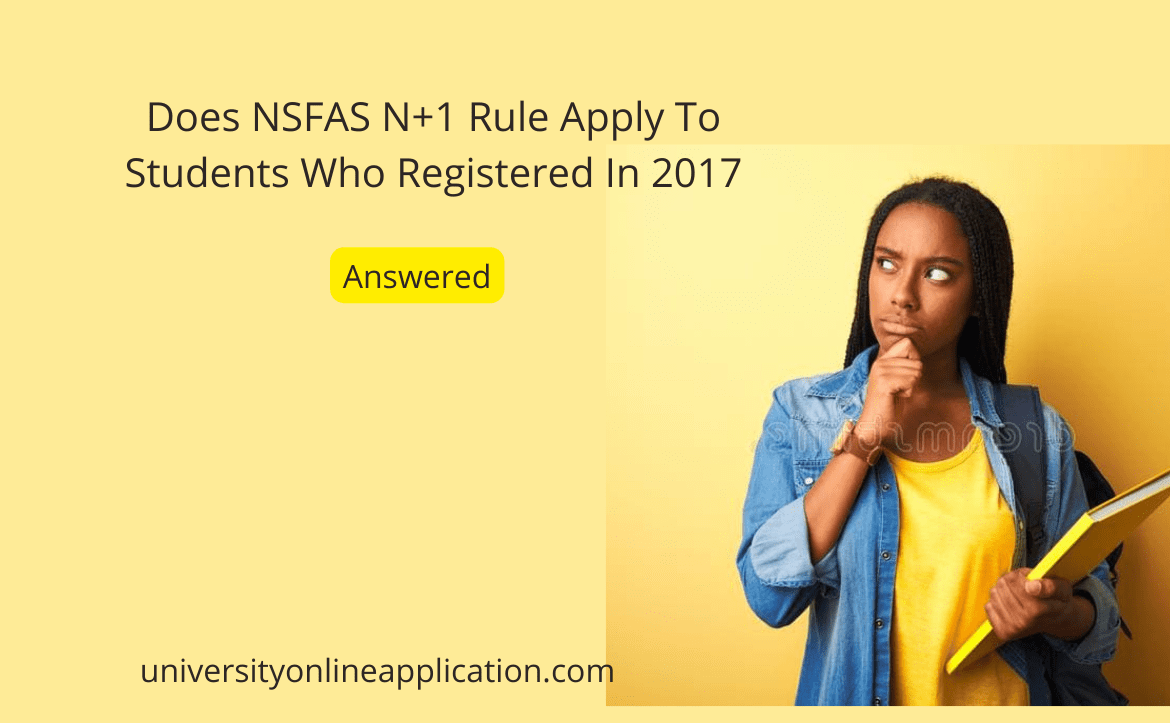Does NSFAS N+1 Rule apply to students who registered in 2017? Knowing which students do the NSFAS N+1 effect is one of the most queries students make about the NSFAS N+1 rule.
Are you trying to understand how does NSFAS N+1 rule works, which students does NSFAS N+1 rule affects, which year students who registered are affected by the NSFAS N+1 rule, or how does NSFAS apply N+1 rule? etc.
In this article, we’re providing answers to these questions and as to in which year a student registered is affected by the NSFAS N+1 rule.
We’ll also pick some frequently asked questions (FAQs) related to does NSFAS applies N+1 rule to students who registered in 2017?
So let’s walk you through the topics.
Does NSFAS N+1 Rule Apply To Students Who Registered In 2017?
NSFAS N+1 rule applies and affects first-time entering students who first registered into a university or TVET college after December 2017.
This means the National Student Financial Aid Scheme will only affect the NSFAS N+1 rule on students who registered in 2017.
Again, this explains that students who registered in January 2018 are not affected by the NSFAS N+1 Rule instead, NSFAS will use the N+2 rule on all students who registered in 2018 onwards.
NSFAS N+1 Rule is for students who registered after December 2017.
universityonlineapplication.com
When Does NSFAS Applies N+1 Rules?
NSFAS applies the N+1 rule when a student needs an additional 1 year of funding in order to complete his or her qualification.
The N+1 rule simply means a student needs an extra one year of funding in order to complete his or her qualification.
universityonlineapplication.com
For example, if you registered in an institution to study a 3-year qualification in 2017, both your institution and NSFAS expect that you’ll complete your studies for the qualification you registered for in 2019.
However, in case you could not complete your qualification in 2019, and you’ll need 1 year of studies to complete in 2020, then NSFAS will put in effect the N+1 rule so that, you’ll get an extra 1 year of NSFAS funding to complete your qualification.
We recommend that you read NSFAS N+1 Rule – Fully Explained for detailed information and understanding about the NSFAS N+1 rule.
Again, you should still qualify for the funding before the National Student Financial Aid Scheme will apply the rule to fund you with the NSFAS N+1 rule when you need it.
You should read Who Qualifies For NSFAS Funding? to grasp the detailed knowledge on whether you still qualify for NSFAS.
How Does NSFAS N+1 Rule Works?
The NSFAS N+1 rule works when a student needs an extra 1 year of funding in order to complete his or her qualification.
Which Students Does NSFAS N+1 Rule Affect?
The NSFAS affects students who first registered into a university or tvet collage after December 2017.
How Does NSFAS Count Funding Years When Applying N+1 Rule?
Your years of funding are countered from the first year you registered to study in an institution, not the first year you started receiving NSFAS funding when NSFAS is applying the N+1 rule.
According to the NSFAS funding rules and their applications, the number of years from which a student is considered for funding starts from the year a student registered and entered into an institution.
This means, NSFAS considers your qualification for funding in terms of years from the very first year you registered into an institution and not from the year you first received your funding.
For example, if 2017 was the first year you ever registered to study in a university or a TVET college, NSFAS counts 2017 as the first time in which you actually qualified for NSFAS even though you may have been approved and received funding starting from 2018.
NSFAS will still consider your years of funding from the very first time you registered into an institution and not the very first time you actually started receiving NSFAS funding when applying the N+1 rule.
Why Is NSFAS Rejecting Me for N+1 When I Have Not Exceeded?
You may have registered for a 3-year qualification starting from 2017 and you’re expected to complete it in 2019, NSFAS will fund you in 2020 if you need 1 extra year to complete your qualification; thus applying the N+1 rule.
In such a case, you’re using the N+1 rule to complete your qualification in 2020.
However, if you could not complete your qualification in 2020, NSFAS will refuse to give you funding in 2021 because you have exceeded your N+1 rule.
So, the main question is, how many years does NSFAS funds student?
For full understanding, you should read How Many Years Can NSFAS Fund You? to know the number of years that NSFAS is willing to fund you.
We do hope this article answered the question does NSFAS N+1 rule apply to students who registered in 2017?
You can ask your questions in the comment section.



1 comment
Good day,
I started my extended degree program of 4years in 2017 unfortunately for me, due to life problems I still have two courses to complete my 4-year program in 2022, my n+1 rule applied last year. is nsfas going to allow for those who have exceeded the n+ rule to appeal at least, because it seems there hasn’t been communication to those who have exceeded the n+ rule or should we take it as we won’t be funded by nsfas ?
I look forward to your response